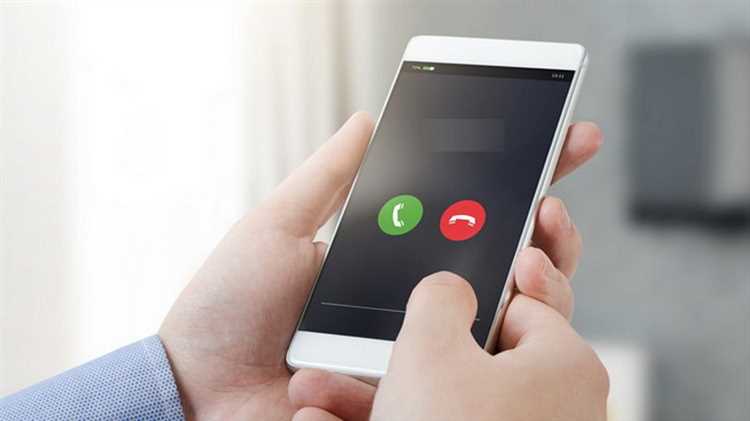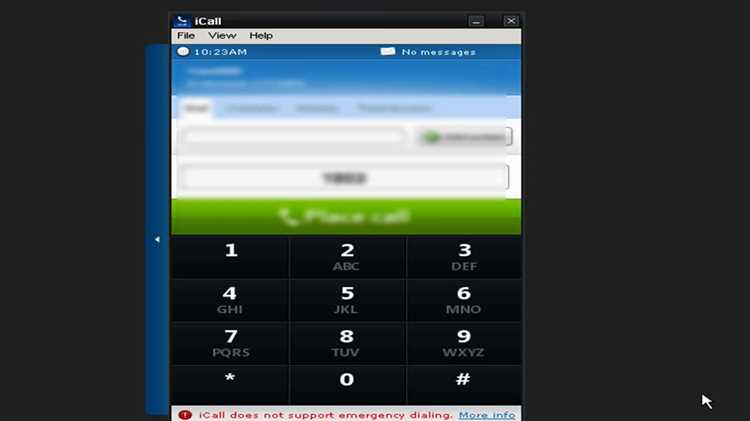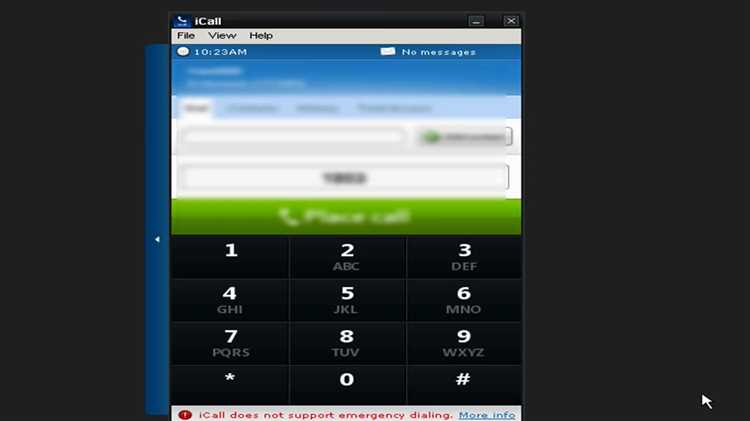In today’s digital age, communication has become increasingly reliant on the internet. Smartphones have taken center stage in our daily lives, offering a myriad of features and capabilities. Apple iPhones, in particular, have become an integral part of our communication toolkit. But can iPhones make calls over the internet?
The answer is yes! iPhones have the ability to make calls over the internet, thanks to a technology called Voice over Internet Protocol (VoIP). VoIP allows users to make voice and video calls over the internet, bypassing traditional phone lines and reducing costs. While iPhones can still make traditional cellular calls, VoIP offers an alternative that leverages the power of the internet.
With the help of various VoIP apps available on the App Store, iPhone users can take advantage of this technology. Apps like Skype, WhatsApp, and Facetime provide VoIP capabilities, allowing users to make calls to other app users, as well as traditional phone numbers. These apps use the internet to transmit audio and video signals, transforming your iPhone into a powerful communication device.
VoIP calls on iPhones offer numerous benefits. They often provide better call quality, especially when using a stable internet connection. They can also save you money, as VoIP calls are typically cheaper than traditional phone calls, especially for international or long-distance communication. Furthermore, VoIP calls can be made anywhere in the world, as long as there is an internet connection, making them a convenient option for travelers and remote workers.
Overview of VoIP Technology
Voice over Internet Protocol (VoIP) technology allows users to make phone calls using an internet connection instead of traditional phone lines. It converts voice signals into digital packets that can be transmitted over the internet, similar to how data is sent. VoIP technology has revolutionized communication as it offers numerous benefits over traditional phone systems.
One of the key advantages of VoIP technology is cost savings. Since VoIP uses the internet to transmit calls, it eliminates the need for expensive phone lines and long-distance charges. Users only need an internet connection to make calls, whether it is through a Wi-Fi network or mobile data. This can significantly reduce communication costs, especially for international calls.
Another benefit of VoIP technology is its flexibility and scalability. Unlike traditional phone systems, VoIP allows users to add or remove phone lines easily. This is particularly useful for businesses that need to scale their communication infrastructure to accommodate growth or changes in their organization.
VoIP technology also offers a wide range of features and functionalities. Users can enjoy call forwarding, call waiting, voicemail, and caller ID, among others. Additionally, VoIP systems often come with collaboration tools like instant messaging, video conferencing, and screen sharing, enabling businesses to enhance their communication and productivity.
Furthermore, VoIP technology supports mobility. With a VoIP-enabled device, users can make and receive calls from anywhere with an internet connection. This is especially beneficial for remote workers, field employees, and frequent travelers, as they can stay connected using their preferred devices, be it a laptop, tablet, or smartphone.
However, VoIP technology also has its challenges. Since it relies on the internet connection, the call quality can be affected by network congestion or limited bandwidth. Users may experience dropped calls, delays, or poor sound quality. To ensure a reliable and high-quality connection, a stable and high-speed internet connection is necessary.
In conclusion, VoIP technology has transformed the way we communicate by leveraging the power of the internet. It offers cost savings, flexibility, scalability, advanced features, and mobility. While it may have some limitations, VoIP technology continues to evolve, providing individuals and businesses with a versatile and efficient communication solution.
Understanding VoIP Capabilities
VoIP (Voice over Internet Protocol) refers to the technology that enables voice calls to be made over the internet rather than through traditional phone lines. This technology has revolutionized communication by allowing people to make calls from anywhere in the world as long as they have an internet connection.
When it comes to iPhones, Apple has integrated VoIP capabilities into their devices, allowing users to make calls over the internet. This feature is particularly useful because it allows users to bypass traditional phone networks and make calls using data or Wi-Fi connections.
There are several ways in which iPhones can utilize VoIP capabilities:
- FaceTime: FaceTime is Apple’s own VoIP service that enables users to make voice and video calls over the internet. It is exclusive to Apple devices and offers high-quality audio and video communication.
- Third-Party VoIP Apps: Apart from FaceTime, iPhone users can also utilize third-party VoIP apps such as Skype, WhatsApp, Viber, and Google Hangouts. These apps provide similar functionality to FaceTime and allow users to make calls over the internet to both other app users and regular phone numbers.
- Carrier Solutions: Some mobile carriers offer their own VoIP solutions for iPhone users. These solutions may be integrated directly into the iPhone’s operating system or require a separate app. They allow users to make calls over the carrier’s data network instead of traditional phone lines.
VoIP capabilities on iPhones offer several benefits to users:
- Cost savings: Making calls over the internet can be significantly cheaper than traditional phone calls, especially for international calls.
- Flexibility: With VoIP, users can make calls from anywhere as long as they have an internet connection, making it particularly useful for travelers.
- Integration: VoIP apps can integrate with other communication services, such as messaging and video calling, providing a unified communication experience.
- Multi-platform compatibility: Many VoIP apps are available for both iOS and Android devices, allowing users to make calls across different platforms.
Overall, the VoIP capabilities of iPhones have opened up new possibilities for communication, providing users with more flexibility and cost savings. With the increasing availability of reliable internet connections, VoIP is becoming increasingly popular and is expected to continue to evolve in the future.
Exploring VoIP Features on Apple Devices
Apple devices, such as iPhones, have built-in VoIP (Voice over Internet Protocol) capabilities that allow users to make calls over the internet. These VoIP features provide a convenient and cost-effective alternative to traditional phone calls.
Wi-Fi Calling:
One of the key VoIP features on Apple devices is Wi-Fi Calling. This feature enables iPhone users to make and receive calls using a Wi-Fi network instead of relying on the cellular network. Wi-Fi Calling is especially useful in areas with weak cellular coverage or when traveling internationally, as it allows for seamless communication over a stable internet connection.
FaceTime Audio:
Another notable VoIP feature on Apple devices is FaceTime Audio. FaceTime Audio is an extension of the popular FaceTime video calling feature, but it focuses solely on voice calls. It utilizes VoIP technology to provide high-quality voice conversations over the internet. FaceTime Audio is an excellent option for making free or low-cost calls to other Apple device users, as it only requires an internet connection.
Third-Party VoIP Apps:
In addition to the built-in VoIP features, Apple devices also support third-party VoIP apps. These apps, such as Skype, WhatsApp, and Viber, allow users to make calls to other app users around the world. These apps often provide additional features like group calling, multimedia sharing, and international calling plans.
It’s important to note that while VoIP calls can be cost-effective, they rely on a stable internet connection. Issues such as poor Wi-Fi signal or limited data availability can affect call quality. However, with the increasing popularity of Wi-Fi networks and the expansion of cellular coverage, the overall reliability of VoIP calling on Apple devices continues to improve.
In conclusion, Apple devices have various VoIP features that enable users to make calls over the internet. Wi-Fi Calling, FaceTime Audio, and third-party VoIP apps all provide convenient alternatives to traditional phone calls. With the increasing accessibility of Wi-Fi networks, VoIP calling on Apple devices is becoming a reliable and cost-effective communication option for users.
Advantages of Making Calls Over the Internet
Making calls over the internet, also known as Voice over Internet Protocol (VoIP) calling, offers various advantages over traditional phone calls. These advantages have led to the increasing popularity of VoIP calling, especially through smartphones such as iPhones. Here are some key advantages of making calls over the internet:
- Cost Savings: One of the biggest advantages of VoIP calling is the significant cost savings it offers compared to traditional phone calls. VoIP calls can be made using data or Wi-Fi connections, eliminating the need for expensive phone plans and long-distance charges. International calls, in particular, can be much cheaper when made over the internet.
- Flexibility: VoIP calling allows users to make calls from anywhere in the world as long as they have an internet connection. This flexibility is particularly beneficial for businesses with remote employees or individuals who frequently travel. With VoIP, users can make and receive calls using their smartphone, tablet, or computer, providing ultimate flexibility.
- Enhanced Features: VoIP calling offers a wide range of enhanced features that are not available with traditional phone calls. These features can include call forwarding, voicemail transcription, virtual phone numbers, video calling, and more. These features enhance productivity and communication efficiency, especially for businesses.
- Integration with Other Applications: VoIP calling can easily integrate with other applications and services. For example, VoIP calling can be integrated with customer relationship management (CRM) systems, enabling businesses to have a unified communication platform. This integration can streamline workflows and improve overall communication and customer service.
- Scalability: VoIP calling offers scalability, allowing businesses and individuals to easily expand or reduce their calling capabilities based on their needs. Unlike traditional phone systems that require physical lines and equipment, VoIP calling can be scaled up or down with minimal effort and cost.
- High-Quality Calls: With advancements in internet connectivity and technology, VoIP calls can provide high-quality audio and video calls. While a stable and good internet connection is important for optimal call quality, VoIP calls often offer better sound clarity and connection reliability compared to traditional phone calls.
Overall, making calls over the internet has numerous advantages that cater to the evolving needs of individuals and businesses in a digital age. The cost savings, flexibility, enhanced features, integration capabilities, scalability, and high call quality make VoIP calling a compelling choice for communication needs.
Limitations and Considerations
While iPhones have the ability to make calls over the internet using VoIP technology, there are several limitations and considerations to be aware of:
- Internet Connection: Making calls over the internet requires a stable and reliable internet connection. If the internet connection is weak or unstable, there may be issues with call quality or dropped calls.
- Data Usage: VoIP calls utilize data from your internet plan, so it’s important to consider your data usage if you have a limited data plan. Making frequent or long VoIP calls can use up a significant amount of data.
- Call Quality: The quality of VoIP calls can vary depending on factors such as the speed and stability of the internet connection, the strength of the Wi-Fi or cellular signal, and the quality of the VoIP service provider. In some cases, the call quality may not be as good as traditional cellular calls.
- Emergency Calls: While VoIP calling is generally reliable, it’s important to note that emergency calls made over VoIP may not always include accurate location information. In some cases, emergency services may not be able to immediately identify your location when you make a VoIP emergency call.
- App Dependence: Making VoIP calls on an iPhone typically requires the use of a third-party app. This means that you may need to download and set up an app specifically for VoIP calling, and you may also need to pay for any associated services or features.
- Compatibility: Not all iPhone models or iOS versions may support VoIP calling or certain VoIP apps. It’s important to check the compatibility of your iPhone and iOS version with the specific VoIP service or app you intend to use.
Overall, while iPhones offer the capability to make calls over the internet using VoIP, it’s important to consider these limitations and make informed decisions based on your specific needs and circumstances.
Comparing VoIP Services for Apple Devices
VoIP (Voice over Internet Protocol) services have become a popular choice for making calls over the internet using Apple devices. With the advancements in technology and the availability of high-speed internet connections, it is now possible to make high-quality voice calls using VoIP services on iPhones, iPads, and Macs. In this article, we will compare some popular VoIP services for Apple devices.
1. FaceTime
FaceTime is Apple’s proprietary VoIP service that allows users to make video and audio calls between Apple devices. It is built into iPhones, iPads, and Macs and offers seamless integration with iOS and macOS. FaceTime uses the device’s camera and microphone to facilitate video and voice calls, delivering high-quality audio and video.
2. Skype
Skype is one of the most popular VoIP services available on multiple platforms, including Apple devices. It offers free voice and video calls between Skype users and allows for calls to landlines and mobile numbers at affordable rates. Skype also supports group video calls and messaging, making it a versatile VoIP solution.
3. WhatsApp
WhatsApp, a widely-used messaging app, also offers VoIP calling functionality. It enables users to make free voice and video calls to other WhatsApp users worldwide. With its large user base and cross-platform availability, WhatsApp is a convenient choice for VoIP calls on Apple devices.
4. Viber
Viber is another popular VoIP service that provides free voice and video calls, as well as messaging features. It offers end-to-end encryption for secure communication and has a user-friendly interface. Viber also allows users to make calls to landlines and mobile numbers at competitive rates.
5. Google Hangouts
Google Hangouts is a versatile communication platform that includes VoIP calling features. It enables users to make voice and video calls to other Hangouts users or phone numbers. Google Hangouts also integrates with other Google services, such as Gmail and Google Calendar, making it a convenient solution for Apple device users who already use Google’s ecosystem.
6. Facebook Messenger
Facebook Messenger is a popular messaging app that offers VoIP calling capabilities. Users can make free voice and video calls to other Messenger users through the app. As Facebook has a massive user base, Messenger can be a convenient choice for Apple device users who frequently interact with their Facebook friends and contacts.
Conclusion
When it comes to VoIP services for Apple devices, there are several options available to suit different needs and preferences. Whether you prefer Apple’s native FaceTime, the versatility of Skype, the widespread use of WhatsApp, the security of Viber, the integration with Google services in Google Hangouts, or the convenience of Facebook Messenger, you can find a VoIP service that meets your requirements.
Consider the features, user interface, availability, and cost when comparing and choosing a VoIP service for your Apple device. Ultimately, the choice will depend on your specific needs and how you plan to use VoIP calling on your Apple device.
FAQ:
Can iPhones make calls over the internet?
Yes, iPhones have the capability to make calls over the internet using VoIP (Voice over Internet Protocol) technology.
How does VoIP work on iPhones?
VoIP on iPhones works by converting the voice signal into digital packets and transmitting them over an internet connection, instead of using traditional phone lines.
Do I need a special app to make VoIP calls on my iPhone?
Yes, you need to download and install a VoIP app from the App Store in order to make VoIP calls on your iPhone.
What are some popular VoIP apps for iPhones?
Some popular VoIP apps for iPhones include Skype, WhatsApp, Viber, and FaceTime.
Can I make free calls on my iPhone using VoIP?
Yes, you can make free calls on your iPhone using VoIP if you have a stable internet connection and are using a VoIP app that offers free calling.
Are there any limitations to making VoIP calls on iPhones?
While making VoIP calls on iPhones is generally convenient, there are some limitations such as the need for a reliable internet connection, potential call quality issues, and the necessity of having the same app installed on both the caller and receiver’s devices.
Can I make international calls using VoIP on my iPhone?
Yes, you can make international calls using VoIP on your iPhone, but it would depend on the app you are using and the calling rates or plans offered by that particular app.


